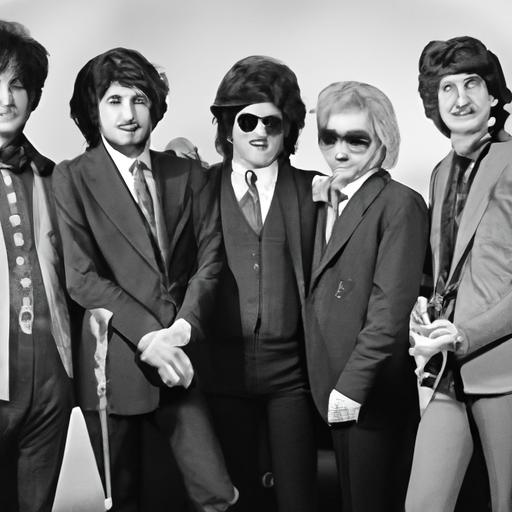Is Traveling Back in Time Possible?
Introduction
Have you ever wondered if it’s possible to travel back in time? The concept of time travel has captivated the human imagination for centuries, fueling countless books, movies, and scientific debates. It’s a fascinating idea that sparks curiosity and raises intriguing questions about the nature of time itself. In this article, we’ll delve into the possibility of traveling back in time and explore the scientific theories and discoveries surrounding this concept.
is traveling back in time possible? This question has been the subject of much speculation and scientific exploration. While time travel remains firmly in the realms of science fiction, there are theoretical possibilities and fascinating concepts that have emerged from scientific research.
Theoretical Possibilities of Time Travel
One of the fundamental theories that underpins the possibility of time travel is Albert Einstein’s theory of relativity. According to this theory, time is not a fixed entity but is rather relative to the observer’s speed and gravitational field. This means that time can be experienced differently depending on the circumstances.
Einstein’s theory also introduces the concept of time dilation, which suggests that time can be stretched or compressed depending on the velocity or gravitational field. For instance, astronauts who spend extended periods in space experience a slightly slower passage of time compared to those on Earth. This phenomenon has been proven through experiments and is a crucial aspect of the theory of relativity.
While Einstein’s theory provides a foundation for understanding time dilation, there are other scientific theories that support the possibility of time travel. Some theories propose the existence of wormholes, which are hypothetical tunnels that connect different points in spacetime. These wormholes could potentially act as shortcuts, allowing for travel between different points in time.
The concept of wormholes and their relation to time travel will be further explored in the following section. We’ll delve into the potential feasibility of using wormholes for time travel and discuss the existing scientific findings and theories that shed light on this intriguing possibility.
Stay tuned as we unravel the mysteries surrounding time travel and explore the fascinating concept of wormholes in the next section. Can these hypothetical tunnels really enable us to travel back in time? Let’s find out together.
Theoretical Possibilities of Time Travel
Explanation of Einstein’s Theory of Relativity
To understand the theoretical possibilities of time travel, we must first delve into Albert Einstein’s theory of relativity. This groundbreaking theory revolutionized our understanding of space, time, and gravity. According to Einstein, time is not an absolute concept, but rather a dimension that is intertwined with space.
Einstein’s theory proposes that the fabric of spacetime is curved by massive objects, such as stars or black holes. This curvature affects the flow of time, causing it to slow down or speed up depending on the strength of the gravitational field. Essentially, time is not experienced uniformly by all observers, as it is influenced by their relative motion and proximity to massive objects.
Discussion on the Concept of Time Dilation
One of the fascinating consequences of Einstein’s theory of relativity is time dilation. Time dilation occurs when an object or observer moves at speeds close to the speed of light or experiences a strong gravitational field. In these situations, time appears to pass differently for the moving or gravitationally influenced object compared to a stationary observer.
For example, imagine a pair of twins. One twin remains on Earth while the other embarks on a space journey near the speed of light. When the traveling twin returns to Earth after a significant period, they would have experienced time at a slower rate compared to their twin who stayed on Earth. This phenomenon is known as time dilation and has been confirmed by experiments involving atomic clocks and high-speed particles.
Mention of Other Scientific Theories Supporting Time Travel Possibilities
While Einstein’s theory of relativity provides a foundation for understanding time dilation, there are other scientific theories that support the intriguing possibility of time travel. Some theories propose the existence of parallel universes or multiple dimensions, suggesting that time travel could be achieved by traversing these alternate realities.
Additionally, quantum physics, with its complex and enigmatic nature, opens up further avenues for exploring the concept of time travel. Quantum entanglement, superposition, and the notion of “spooky action at a distance” have sparked discussions on the potential manipulation of time using quantum phenomena.
In the next section, we will focus on one of the most captivating concepts related to time travel: wormholes. Join me as we uncover the mysteries surrounding these hypothetical tunnels and their potential role in enabling us to journey back in time.
Wormholes and Time Travel
Explanation of Wormholes and Their Relation to Time Travel
Wormholes, often depicted in science fiction, are hypothetical structures that serve as shortcuts through spacetime. They are like tunnels that connect distant points in the universe, potentially allowing for faster-than-light travel and, intriguingly, time travel.
In the realm of theoretical physics, wormholes are believed to exist as solutions to Einstein’s field equations. While their existence has not been proven, they are mathematically feasible within the framework of general relativity. Wormholes are visualized as “bridges” that can connect two separate regions of spacetime, creating a shortcut between them.
The relation between wormholes and time travel arises from the concept of spacetime curvature. According to general relativity, massive objects, such as stars or black holes, can curve the fabric of spacetime. This curvature creates the potential for wormholes to form, connecting different regions of spacetime.
Discussion on the Potential Feasibility of Using Wormholes for Time Travel
The idea of using wormholes for time travel is both captivating and compleWhile wormholes theoretically offer a potential shortcut through spacetime, their practicality and stability remain major obstacles.
The stability of wormholes is governed by exotic matter, a hypothetical form of matter with negative energy density. In order to keep the wormhole open and traversable, it would require the presence of exotic matter with specific properties. However, the existence and properties of exotic matter are still largely theoretical, and scientists have not yet discovered or created it.
Additionally, the sheer energy required to create and manipulate a wormhole is immense. The energy needed to sustain a stable wormhole large enough for a human or a spacecraft to pass through is beyond our current technological capabilities. The challenges associated with creating and controlling wormholes are significant hurdles that must be overcome before time travel through wormholes becomes a feasible possibility.
Present Scientific Findings and Theories Regarding Wormholes
Scientific research and theoretical studies have shed light on the possibilities and limitations of wormholes for time travel. While the actual existence of wormholes remains hypothetical, scientists have made progress in understanding their theoretical properties.
For instance, studies suggest that traversable wormholes, if they exist, would be subject to certain constraints and limitations. The presence of exotic matter with negative energy density, as mentioned earlier, would be one such requirement. Additionally, the stability of wormholes would need to be carefully considered, as they may collapse or become traversable only in one direction.
Researchers continue to explore the theoretical implications of wormholes, aiming to unravel the mysteries surrounding their formation, properties, and potential applications. As our understanding of the fundamental laws of physics advances, we may one day gain greater insight into the possibilities of utilizing wormholes for time travel.
In the next section, we will delve into the intriguing paradoxes associated with time travel, such as the famous grandfather paradoJoin me as we unravel the mind-boggling puzzles that arise when we contemplate the idea of journeying back in time.
Time Travel Paradoxes
The Grandfather Paradox
One of the most famous time travel paradoxes is the grandfather paradoIt poses a mind-boggling question: What would happen if you were to travel back in time and prevent your own grandfather from meeting your grandmother? If you succeed in altering the past and preventing your own birth, how could you have traveled back in time in the first place?
This paradox highlights the inherent contradictions and complexities that arise when considering the possibility of changing the past through time travel. It challenges the notion of causality and raises thought-provoking questions about the nature of time and its potential resistance to alteration.
Other Time Travel Paradoxes and Their Implications
Beyond the grandfather paradox, there are various other time travel paradoxes that continue to intrigue and puzzle scientists and enthusiasts alike. These paradoxes involve scenarios where the actions of a time traveler create inconsistencies or contradictions that seem impossible to resolve.
One such paradox is the bootstrap paradox, where an object or information is caught in a loop of infinite causality. For example, imagine a person who travels back in time and gives a famous painting to an artist before it was ever created. The question then arises: Where did the painting originate from? It seems to have no clear origin, creating a loop of events that has no discernible beginning.
The possibility of time travel paradoxes has led to extensive debates among scientists and philosophers. Some argue that these paradoxes indicate the impossibility of time travel, as they suggest a break in the causal chain of events. Others propose alternative theories, such as the existence of parallel universes or the idea that time travel may be limited to specific timelines that cannot be altered.
Arguments for and against the Possibility of Time Travel Paradoxes
When it comes to the possibility of time travel paradoxes, opinions differ. Some argue that the existence of paradoxes is a clear indication that time travel is implausible, as it would disrupt the fundamental laws of cause and effect. They believe that the universe has mechanisms in place to prevent such paradoxes from occurring.
On the other hand, proponents of time travel point out that our current understanding of the universe may be limited. They suggest that future scientific advancements could reveal new insights and solutions to these paradoxes, allowing us to reconcile the apparent contradictions and make time travel a viable possibility.
As the debate continues, scientists and theorists around the world are actively researching and exploring the potential implications and limitations of time travel. The study of time travel paradoxes pushes the boundaries of our understanding and challenges us to reevaluate our perceptions of time and its intricacies.
Join me in the next section as we delve into real scientific experiments and discoveries that shed light on the possibility of time travel. Let’s uncover the exciting advancements that have been made and the current challenges researchers face in unraveling the mysteries of time travel.
Scientific Experiments and Discoveries
Overview of Scientific Experiments Attempting to Explore Time Travel
Scientists and researchers have long been fascinated by the idea of time travel, leading to numerous experiments and studies aimed at unraveling its mysteries. While time travel remains elusive, these endeavors have provided valuable insights and pushed the boundaries of our understanding.
One notable experiment is the famous Hafele-Keating experiment conducted in 1971. Scientists measured the effects of time dilation by comparing atomic clocks aboard airplanes and stationary clocks on Earth. The experiment confirmed Einstein’s theory of relativity, showcasing that time does indeed pass differently depending on factors such as speed and gravitational forces.
Another experiment worth mentioning is the use of particle accelerators. These powerful machines propel particles at incredibly high speeds, approaching the speed of light. By observing the behavior of these particles, scientists hope to gain a deeper understanding of time dilation and potentially unlock the secrets of time travel.
Notable Discoveries Related to Time Travel Research
Over the years, researchers have made fascinating discoveries that shed light on the possibilities and limitations of time travel. One significant finding is the confirmation of the existence of black holes. These enigmatic cosmic objects possess immense gravitational pull, distorting the fabric of spacetime. Scientists theorize that black holes could potentially create conditions suitable for time travel, although the practicality of harnessing this phenomenon remains uncertain.
Additionally, advancements in quantum mechanics have opened up intriguing possibilities for time travel research. Quantum entanglement, a phenomenon where particles become interconnected regardless of distance, has sparked speculation about the potential for instantaneous communication across time. While this remains theoretical, it highlights the ongoing exploration of unconventional avenues that may hold the key to time travel.
Present Limitations and Challenges in Conducting Time Travel Experiments
Despite the progress made in scientific experiments, several limitations and challenges hinder our ability to conduct conclusive time travel experiments. First and foremost, the vast energies and technologies required to manipulate spacetime are currently beyond our reach. Theoretical concepts like wormholes remain purely speculative, and the practical implementation of such phenomena remains a distant dream.
Moreover, ethical concerns arise when contemplating the implications of time travel. The potential for altering the course of history or creating paradoxes raises questions about the consequences of tampering with the past. These ethical considerations, coupled with the technical challenges, necessitate careful analysis and responsible exploration of time travel research.
While scientific experiments and discoveries continue to push the boundaries of our knowledge, time travel remains firmly in the realm of speculation and imagination. However, our relentless pursuit of knowledge and exploration ensures that the quest to understand time and its mysteries will persist, keeping the doors open for future breakthroughs.
Stay tuned for the concluding section as we recap the main points discussed and contemplate the possibility of traveling back in time.
Conclusion
In conclusion, the question of whether traveling back in time is possible continues to intrigue and captivate our imaginations. While time travel remains firmly in the realm of speculation and science fiction, scientific theories and research have shed light on fascinating possibilities.
We explored Einstein’s theory of relativity, which introduced the concept of time dilation and highlighted the relativity of time based on speed and gravitational fields. This theory forms the foundation for understanding the potential manipulation of time.
Additionally, the concept of wormholes emerged as a potential avenue for time travel. These hypothetical tunnels, connecting different points in spacetime, have captured the attention of scientists and science fiction enthusiasts alike. While wormholes are purely theoretical at this stage, the scientific community continues to explore their feasibility and implications.
It is important to note that time travel paradoxes, such as the grandfather paradox, present significant challenges and potential contradictions in the concept of time travel. These paradoxes raise thought-provoking questions about the implications of altering the past and the resulting consequences.
As we conclude our exploration of time travel, it is crucial to acknowledge the limitations and challenges in conducting scientific experiments in this field. Time travel remains a subject of ongoing research and exploration, and future discoveries may bring us closer to understanding its possibilities.
In the meantime, the concept of time travel continues to inspire our creativity and fuel our fascination with the unknown. So, keep your imagination fueled and your curiosity alive. Who knows what the future holds? Perhaps one day, we might unravel the mysteries of time travel and embark on incredible journeys through the fabric of time itself.
Thank you for joining me on this exploration of time travel. Until next time, keep questioning, keep dreaming, and keep seeking the answers to the mysteries that surround us.





